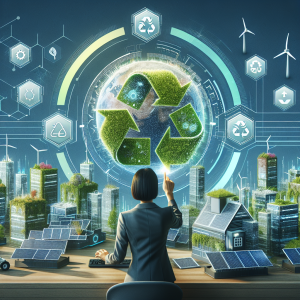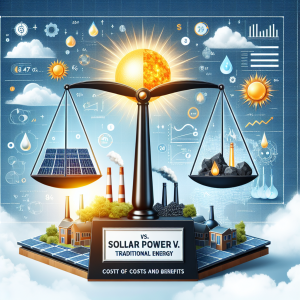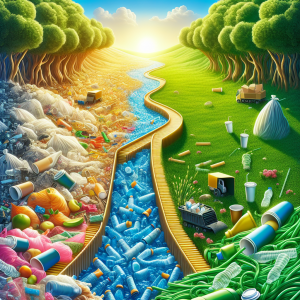Innovative Technologies for a Sustainable World
Innovative technologies are becoming the backbone of sustainability, driving unprecedented advancements in how we approach environmental challenges. One of the most promising areas is renewable energy. Solar and wind technologies have evolved significantly, offering more efficient and cost-effective solutions. Modern photovoltaic cells, for example, benefit from advances in materials science that increase energy conversion efficiency. Meanwhile, large-scale wind turbines leverage state-of-the-art aerodynamics and materials engineering to harness greater amounts of energy even in less windy locations.
In addition to renewable energy generation, energy storage technologies are paving the way for a more sustainable world. Lithium-ion batteries, long the standard, are now being challenged by next-generation alternatives like solid-state batteries and flow batteries. These new technologies promise longer life cycles, higher energy density, and enhanced safety, making them indispensable as we transition to cleaner energy grids. Companies worldwide are investing heavily in research and development to overcome the limitations of current storage solutions, seeking to integrate these new technologies into existing infrastructures seamlessly.
Smart grid technologies represent another significant advancement. By digitizing the power grid, these systems improve efficiency and reliability through real-time data analytics, machine learning, and automation. Smarter grids reduce energy waste by detecting and responding to fluctuations in energy demand and supply. The Internet of Things (IoT) plays a crucial role here, facilitating communication between various energy devices and systems to optimize resource distribution and consumption eagerly. This digitization is also empowering consumers to make informed decisions around energy use, further contributing to sustainability goals.
In the realm of transportation, innovative technologies are set to revolutionize how we move. Electric vehicles (EVs) are becoming mainstream, with advances in battery technology driving longer ranges and quicker charging times. However, other technologies such as hydrogen fuel cells are gaining momentum. Hydrogen offers a clean alternative, with water being the primary byproduct. Major automotive manufacturers are investing in hydrogen infrastructure, signaling a significant shift towards zero-emission transport. Alongside individual vehicles, public transportation systems are also embracing electrification and autonomous technologies. Smart bus fleets and driverless trains powered by clean energy sources not only reduce emissions but also improve urban mobility efficiency.
Agriculture, another significant contributor to global emissions, is benefiting from the rise of precision farming technologies. Drones and satellite imagery offer tailored insights into soil health, crop growth, and pest activity. These data-driven approaches enable farmers to use fertilizers, water, and pesticides more efficiently, minimizing environmental impact. Additionally, vertical farming and aquaponics represent cutting-edge innovations allowing for urban agriculture, which reduces the transportation footprint and fosters local food systems. These methods use significantly less water and land, addressing crucial sustainability issues.
Circular economy principles are increasingly relevant in waste management. Advanced waste sorting technologies employ machine learning and robotics to improve recycling rates and material recovery. Artificial intelligence (AI) enables facilities to identify and separate materials with precision, thereby enhancing the recycling process’s efficiency. Furthermore, the development of biodegradable materials and innovations in chemical recycling methods aim to divert waste from landfills and incinerators, fostering a more sustainable consumption model.
Water scarcity is a pressing global issue, and technologies like desalination and water recycling are crucial in addressing this challenge. Modern desalination plants utilizing reverse osmosis and forward osmosis have become more energy-efficient, making them a viable option for providing fresh water. Concurrently, water treatment technologies are evolving to ensure safe and sustainable water reuse in industrial and agricultural settings. The integration of nanotechnology in filtration systems is proving effective in removing contaminants, further guaranteeing the supply of clean water for communities worldwide.
Urban environments are pivotal in the sustainability quest. Green building technologies, including smart HVAC systems and sustainable construction materials, offer improvements in energy efficiency and reduce carbon footprints. Materials such as cross-laminated timber and recycled steel are gaining popularity in construction, alongside advanced insulation materials that significantly reduce energy demands. Furthermore, urban planning is leveraging digital twins—virtual models of cities—to optimize everything from traffic flows to public service delivery, ultimately leading to more sustainable urban development.
Biotechnology is also making significant strides in sustainability. Innovations in biofuels and bioplastics are reducing dependency on fossil fuels, offering cleaner alternatives. Genetic engineering is creating crops resistant to climate change’s adverse effects, thereby securing food supplies while minimizing resource use. Innovations like lab-grown meat are emerging to reduce the environmental impact of livestock, which is one of the largest contributors to greenhouse gas emissions. By reducing reliance on traditional agriculture, these technologies promise a more sustainable food system.
In the burgeoning field of carbon capture and storage (CCS), advancements aim to mitigate climate change’s worst impacts. New chemical processes and materials are enhancing the efficiency and scalability of capturing CO2 from industrial emissions and atmosphere. CCS technologies are gaining traction, with numerous pilot projects worldwide experimenting with various capture, storage, and even utilization techniques to transform captured carbon into useful products like building materials or synthetic fuels.
Blockchain technology, often associated with cryptocurrencies, is finding its place in sustainability. By providing transparency and traceability, blockchain can enhance environmental supply chains, ensuring resources are managed responsibly. This technology is particularly effective in certifying sustainable practices and improving the credibility of carbon trading markets. The immutable and decentralized nature of blockchain records makes it a powerful tool for monitoring environmental compliance and encouraging accountability among corporations and governments alike.
In conclusion, as we advance, the role of innovative technologies is becoming increasingly crucial in paving the way to a sustainable world. From transforming energy systems and revolutionizing transportation to optimizing agricultural practices and enhancing urban infrastructure, these technological advancements are vital in addressing the current and future environmental challenges we face. Through strategic investment and global collaboration, these technologies hold the potential to foster a resilient and sustainable future.




